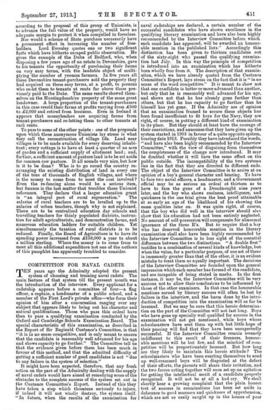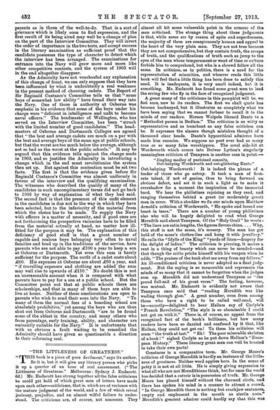COMPETITION FOR NAVAL CADETS. T EN years ago the Admiralty adopted
the present system of choosing and training naval cadets. The main feature of that system till the present month was the introduction of the interview. Every applicant for a cadetship appears before a committee of four—a flag officer, a captain, a headmaster of a public school, and a member of the First Lord's private office—who form their opinion of him after a conversation ranging over any subject that appears likely to bring out his character and natural qualifications. Those who pass this ordeal have then to pass a qualifying examination conducted by the Oxford and Cambridge Schools Examination Board. The special characteristic of this examination, as described in the Report of Sir Reginald Custance's Committee, is that "it is in no sense competitive, and is only meant to ensure that the candidate is reasonably well advanced for his age and shows capacity to go further." The Committee tell us that the evidence given before them has been much in favour of this method, and that the admitted difficulty of getting a sufficient number of good candidates is not "due to any failure in the system of selection."
It might have been expected, therefore, that any fresh action on the part of the Admiralty dealing with the supply of naval cadets would have aimed at remedying some of the obstacles to the complete success of the system set out in the Custance Committee's Report. Instead of this they have taken a step which threatens seriously to injure, if indeed it will not wholly destroy, the system itself. "In future, when the results of the examination for naval cadetships are declared, a certain number of the successful candidates who have shown excellence in the qualifying literary examination and have also been highly recommended by the Interview Committee before which each candidate has appeared, will be awarded an honour- able mention in the published lists." Accordingly this distinction has been given to thirteen candidates out of the sixty-eight who passed the qualifying examina- tion last July. In this way the principle of competition is introduced into an examination which has hitherto been wholly free from it. The description of that examin- ation, which we have already quoted from the Custa.nce Committee's Report, lays stress on the fact that it is " in no sense of the word competitive." It is meant to show not that one candidate is better or more advanced than another, but only that he is reasonably well advanced for his age, and shows not that he has already gone further than others, but that he has capacity to go further than he himself has yet gone. If the Admiralty are of opinion that an examination framed to secure these objects has been found insufficient to fit boys for the Navy, they are right, of course, in putting a different kind of examination in its 'place. But they should at least have the courage of their convictions, and announce that they have given up the system started in 1903 in favour of a quite opposite system, bearing date 1913. Possibly they have introduced the words. "and have also been highly recommended by the Interview Committee," with the view of disguising from themselves the completeness of the change now introduced. It may be doubted whether it will have the same effect on the public outside. The incompatibility of the two systems lies in the fact that they are directed to different ends. The object of the Interview Committee is to arrive at an opinion of a boy's general character and bearing. To have to face two naval officers, a headmaster, and a Government official may be as serious an ordeal at thirteen as to have to face the guns of a Dreadnought nine years later, and the boy who shows coolness, intelligence, and quickness in the one trial gives the best proof attainable at so early an age of the likelihood of his showing the same qualities later on. It was quite right, of course, that the boy who did well in the interview should also show that his education had not been entirely neglected. No amount of self-possession will compensate for abnormal ignorance of the three R's. But to require that a boy who has deserved honourable mention in the literary examination shall also have been highly recommended by the Interview Committee is to lose sight of the essential difference between the two distinctions. "A double first" testifies to a combination of several kinds of knowledge, but when the value, for a particular purpose, of one set of these is immensely greater than that of the other, it is an evident mistake to treat them as equally important. The decisions of the Interview Committee are founded upon the general impression which each member has formed of the candidate, and are incapable of being stated in marks. In the first instance, it may be, the Interview Committee will be very anxious not to allow their conclusions to be influenced by those of the other examiners. In that case the honourable mentions earned by literary success will often be lost by failure in the interview, and the harm done by the intro- duction of competition into the examination will so far be lessened. But we may be sure that this heroic determina- tion on the part of the Committee will not last long. Boys who have gone up specially well qualified for success in the examination will not get mentioned, while boys whose schoolmasters have sent them up with but little hope of their passing will find that they have been unexpectedly successful. If the Interview Committee remain serenely indifferent to this result of their firmness, honour- able mentions will be but few, and the mischief of com- petition will be proportionately lessened. But how long are they likely to maintain this heroic attitude ? The schoolmasters who have been exerting themselves to send up well-crammed boys will be disgusted at the defeat of their efforts, the parents will share their irritation, and the two forces acting together will soon set up an agitation for getting the intellectual merit of a candidate properly recognized. It will not be at all a bad cry. We shall shortly hear a growing complaint that the plain honest test of success in examinations has been set aside in deference to good manners and quickness of apprehension, which are not so easily caught up in the homes of poor parents as in those of the well-to-do. That is a sort of grievance which is likely soon to find expression, and the first result of its being aired may well be a change of plan on the part of the Interview Committee. They will invert the order of importance in the two tests, and accept success in the literary examination as sufficient proof that the candidate possesses the type of character to detect which the interview has been arranged. The examinations for entrance into the Navy will grow more and more like other competitive contests, and the system of 1903 will in the end altogether disappear. As the Admiralty have not vouchsafed any explanation of this change of front, we can only suppose that they have been influenced by what is undoubtedly a real weakness in the present method of choosing cadets. The Report of Sir Reginald Custance's Committee tells us that "some boys of somewhat low ability" have found their way into the Navy. One of those in authority at Osborne was emphatic in his evidence that some of the boys under his charge were "deficient in intelligence and unfit to become naval officers." The headmaster of Wellington, who has served on the Interview Committee, has been "struck with the limited number of good candidates." The head- masters of Osborne and Dartmouth Colleges are agreed that "the best and average cadets are much on a par with the best and average boys of the same age at public schools, but that the worst are too much below the average, although not so bad as the worst at the public schools." It may be argued that this evidence tells against the change made in 1903, and so justifies the Admiralty in introducing a change which in the end must revolutionize the system then set up. But against this contention must be set two facts. The first is that the evidence given before Sir Reginald Custance's Committee was almost uniformly in favour of the interview and the qualifying examination. The witnesses who described the quality of many of the candidates in such uncomplimentary terms did not go back to 1903 by way of explanation of what they had said. The second fact is that the presence of this unfit element in the candidates is due not to the way in which they have been selected, but to the inferiority of the material from which the choice has to be made. To supply the Navy with officers is a matter of necessity, and if good ones are not forthcoming the prospective vacancies have to be filled from the material actually at hand, no matter how ill- fitted for the purpose it may be. The explanation of this deficiency of good stuff is that a great number of capable and zealous boys belonging very often to naval families and bred up in the traditions of the service, have parents who are not able to pay £100 a year to keep a. son at Osborne or Dartmouth. Yet even this sum is barely sufficient for the purpose. The outfit of a cadet costs about £60. His expenses at Osborne are about £93 a year, and "if travelling expenses and clothing are added the sum may well rise to upwards of £110." No doubt this is not an unreasonable amount when it is compared with what parents have to pay for a son at a public school. But the Committee point out that at public schools there are scholarships, and that in many of them boys are able to live at home. Neither of these ameliorations are open to parents who wish to send their sons into the Navy. "To many of them the normal fees of a boarding school are absolutely prohibitive," yet among the boys who are thus shut out from Osborne and Dartmouth "are to be found some of the ablest in the country, and many others who from parentage, early training, ability, and character are eminently suitable for the Navy." It is unfortunate that with so obvious a fault waiting to be remedied the Admiralty should have given so questionable a direction to their reforming zeal.











































 Previous page
Previous page